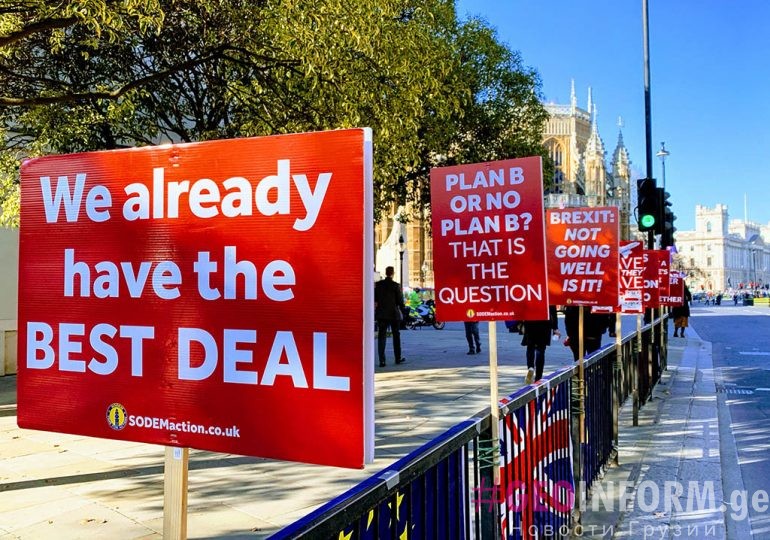Everyone knows that Great Britain has decided to leave the European Union. The process of Britain leaving the EU has been called “Brexit”. Но это оказалось не так просто. И Великобритания и ЕС хотят обеспечить себе более выгодное положение в торгово-экономической и геополитической сферах после Brexit. Давайте разберемся в сути вопроса и подумаем, как Brexit может быть полезен Грузии.
What is a no-deal Brexit?
As the 31 December 2020 deadline for a trade agreement between the European Union and the United Kingdom approaches, the risk of a “no deal” Brexit increases. When the UK initiated Brexit on 31 January 2020, the Withdrawal Agreement provided 11 months to negotiate a new trading relationship and extended the UK's participation in the EU single market and customs union during the transition period.
If no deal is reached by the deadline, it will trigger a so-called no-deal Brexit. In this case, trade relations between the UK and the EU will be governed by trade rules by default World Trade Organization (WTO).
A sudden switch to WTO rules would significantly increase tariffs and other trade restrictions, raise the cost of goods and complicate regulations, significantly increasing the financial and administrative burden on companies. A no-deal Brexit will greatly impact the UK, causing its gross domestic product (GDP) to contract by 8.1% in 10 years.
What does WTO trade mean for Britain?
Under WTO rules, tariffs on transactions between two WTO members are subject to the WTO's most favored nation (MFN) rule, which requires a member to grant all other WTO members the same lowest tariff that it imposes on certain imported goods or services.
Both the EU and the UK have tariffs and other trade restrictions on MFN countries, so trade between the UK and the EU will suddenly be subject to a whole host of new trade barriers, not just tariffs. Examples of non-tariff barriers include quotas and customs checks for compliance with various regulations. As a member of the EU, goods from the UK do not require customs inspection at EU borders.
Read also: Forecast of GDP, trade balance and inflation rate in Georgia 2021
The exception is that two WTO countries can enter into a bilateral trade agreement to give each other preferential rates below those required by WTO rules. This is why the deal is so important; Without a deal, the UK and EU cannot simply reduce tariffs and non-tariff trade barriers with each other as they would have to do the same for all other WTO countries.
If a deal is reached, it could reduce or even avoid higher tariffs associated with a no-deal Brexit. The UK's costs under WTO rules would go beyond trade with the EU because Brexit would strip the UK of trading rights under EU agreements with 72 other countries. The UK reported new agreements with only 12 countries.
That is, in fact, they lose not just one deal, but dozens. It may also have trouble bringing them back as external trading partners will need to assess the impact of Brexit on their relationships, product sourcing and international locations for operations and financing, which could impact the terms of these new agreements.
WTO non-tariff rules will also apply to the EU-UK. deal. WTO environmental, labor and social standards may be less stringent than the EU standards that the UK currently meets. However, the cost of services will likely increase due to the costs of complying with different sets of rules.
What will be the overall economic impact of Brexit on the UK and the EU?
The cost of these new trade barriers to the UK economy will be significant. Around 90% of British goods exported to the EU will be subject to tariffs. UK GDP and per capita income are estimated to decline by 3.3% to 4.0% over 10 years.
When indirect impacts are taken into account, this reduction rises to a range of 7.6% to 8.1% of UK GDP and income per capita. For the EU, the direct costs of an unconditional Brexit would reduce GDP by 0.7% over 10 years. Even if without EU-UK tariffs.
If a deal is reached, the indirect costs of Brexit would still reduce UK GDP by at least 1% and EU GDP by at least 0.2% in 10 years. A UK government study found that in the absence of a deal, paperwork alone would cost businesses £15 billion ($20.1 billion) a year.
How will Brexit affect individual sectors of the UK and EU economies?
Trade in goods between the UK and the EU:
Trade barriers, new regulatory obstacles that will arise as a result of a no-deal Brexit, will not be distributed evenly; they will be hit much harder in some sectors than others. New trade barriers particularly affect the agricultural and automotive sectors, as well as the manufacturing sector in general.
While the average MFN tariff rate in the EU is 3.2%, tariffs on some UK goods will be significantly higher. Average EU import duties will be 11.1% on agricultural products, 15.7% on animal products and 35.4% on dairy products.
EU tariffs can be as high as 189% on some dairy products and 116% on animal products. UK tariffs on agricultural products will average around 16% and are intended to protect domestic producers of beef, lamb, poultry and pork in particular.
For UK-made cars sold in the EU, the tariff would be 10%, costing £5.7 billion a year and raising the average price of a car sold in the EU by £3,000. More than 30 automobile manufacturers, including Honda Motor Co. (HMC), Toyota Motor Co. (TM) and Jaguar Land Rover Ltd. (part of Tata Motors Ltd. (TTM)) are facing not only significant tariffs but also logistical challenges. because customs controls at borders can slow down movement through the canal.9
No-deal trade in services between UK and EU:
Services, including financial services, make up more than 80% of the UK's GDP, as do professional and technical business services, and financial services made up more than half of its services exports to the EU in 2019.10 4 Travel services are the EU's largest service exports to the UK
Of particular concern is the impact of a no-deal Brexit on the financial sector due to the size of the sector in the UK and the complexity of the regulations governing it. A separate UK and EU regime for banking and financial services will result in increased operating and regulatory costs.
Without a new deal, UK firms will no longer benefit from EU "passporting" privileges, which allow a firm authorized by one EU member to operate in others without needing additional permits.
In 2016, when British voters voted in favor of the Leave referendum, approximately 5,500 UK firms had passporting rights. Without these rights, UK financial firms would need to obtain separate authorization for most activities in each of the 27 EU member states, making it much more difficult to operate in EU markets.
ЕС предложил разрешить британским фирмам пользоваться правами, аналогичными паспортизации, если они соответствуют требованиям ЕС “эквивалентности”. Это означает, что ЕС признает нормативные акты Великобритании, регулирующие набор финансовой деятельности, если они будут сочтены эквивалентными стандартам и постановлениям ЕС для той же деятельности, даже если правила Великобритании не совсем соответствуют правилам ЕС.
However, even such equivalence is only available in the areas of investment banking and insurance; no equivalence rights are offered for retail banking and reinsurance. Expanding the permissible areas for equivalence decisions would require legal action from the EU.
Central counterparty clearing houses have a problem
Одна из областей, которая показывает сложность этой проблемы, – это клиринговые палаты центральных контрагентов (ЦКА). ЦКА – это клиринговые палаты для европейской торговли деривативами, аналогичные клиринговым организациям по деривативам США (DCO). ЕС объявил о некоторых временных разрешениях ЕС, а Европейское управление по ценным бумагам и рынкам (ESMA) will allow three UK central counterparties to operate in the EU from 2021. The UK will continue its “permit” regime for three years.
Due to the complexity and uncertainty of jurisdictional issues, UK banks are setting up foreign entities and relocating staff to the EU, with the most common destinations being Germany, Ireland, the Netherlands and France.
Read also: Georgian real estate market analysis 2021
JPMorgan & Chase Co. (JPM), for example, is moving approximately $230 billion (€200 billion), almost 10% of its total balance sheet, from the UK to its subsidiary in Frankfurt, Germany; 200 London bankers will be transferred to Paris, Frankfurt, Milan and Madrid.
Goldman Sachs Group Inc. (GS) и Morgan Stanley (MS) is also reportedly transferring staff and opening operations in the EU. In February 2019, repo (repo) dealers and two clearing houses in London and Paris moved almost all euro repo clearing from the UK to France; Almost all euro repos are now cleared by the EU Central Committee.
Brexit and Irish Border Protocol
One particularly thorny issue in the Brexit negotiations is that the Irish protocol adopted with the Withdrawal Agreement maintains an open border without any restrictions or tariffs between Northern Ireland, part of the UK, and the Republic of Ireland, a member of the EU.
This open border is intended to preserve the peace established by the 1998 Good Friday Agreement between two groups in Northern Ireland: republicans who wanted to unite the two territories into a single Irish nation, and unionists who wanted Northern Ireland to continue to be part of Great Britain.
The peace agreement ends a long period of violence known as the Troubles. Since the key point of the peace agreement was the opening and demilitarization of the border, any border regulation or control between the two areas could jeopardize the agreement and reignite violence.
Under the Irish Protocol, the UK will levy EU tariffs at the UK border in the Irish Sea on imports from the UK into Northern Ireland that are deemed eligible for remittance into the Republic.
If any EU tariffs are paid on imports from the UK that are not remitted to the Republic but remain in Northern Ireland, they will be refunded. Trade between Ireland and the rest of the EU will continue to be free of tariffs and regulations.
After four years, and at intervals thereafter, Northern Ireland will have the right, but not the obligation, to terminate the Irish Protocol.
How are things going with Brexit now?
British Prime Minister Boris Johnson's recent threats to scrap parts of the Withdrawal Agreement, including the sensitive Irish Protocol, have raised further potential problems. The purpose of the Prime Minister's threat to the Irish Protocol is unclear, but is unlikely to lead to any change.
The EU insists that compliance with the Irish Protocol is a treaty obligation. Moreover, Britain's disregard for the Irish Protocol would harm its own interests: Britain is seeking a trade deal with the United States, in which leaders of both political parties have said they would oppose an agreement if the open Irish border was threatened.
Brexit and the problem of fishing in British waters
However, the opposition in the UK House of Lords blocked the Prime Minister's proposal, which eased tensions somewhat. Unsettled issues include the transfer of British North Sea fishing rights to EU countries. Although fishing is a minor part of the EU economy, the issue is of political importance for Denmark, Belgium, the Netherlands, Ireland, Germany and especially France.
Also undecided is the size of permissible government subsidies for businesses, for which the UK has sought wide latitude. For some time the prospect of an agreement was seriously threatened by the Prime Minister's motion in Parliament to ignore the Irish protocol. The UK proposal would restore the border between Irish territories.
Read also: Georgia leads the Caucasus in the Human Freedom Index 2020
Faced with strong opposition from EU members, and especially from the United States, whose politicians had threatened that breaking the Irish Protocol would lead to a ban on any trade agreement between the US and the UK, the Prime Minister announced that the UK would comply with the Irish Protocol.
To some extent, financial markets have already priced in a no-deal Brexit; therefore, if the deal goes through, the stock could rise. However, due to the significant negative impact of the COVID-19 pandemic on the UK and global economy, the short-term impact of a no-deal Brexit may be difficult to separate from the impact of the pandemic.
How can Brexit be beneficial for Georgia?
At the beginning of December 2020, the UK and Ukraine announced a free trade and visa liberalization agreement. This shows that the Cabinet headed by Boris Johnson is ready for a no-deal exit from the EU, and the UK is looking for new strategic partners. So how can Brexit be beneficial for Georgia?
The Georgian economy is heavily dependent on foreign investment, and all goods produced 51+% in Georgia are duty-free in the EU. Georgia can become an excellent business hub for UK enterprises and factories in order to somehow preserve the EU market.
Еще плюс Грузии для любого западного бизнеса – низкие налоги. В Грузии налоги действительно низкие, к примеру, IT бизнес может платить только 5% при выводе дивидендов, а индивидуальные предприниматели могут платить всего 1% со своего бизнес оборота. О таких налогах мечтают почти все предприниматели в ЕС и Великобритании.
What can Brexit bring for Georgia?
- Robust GDP growth.
- Job creation.
- Recognition in the global business space.
- Stability of the economy, lari exchange rate and political processes.
- Attracting the most advanced and technologically advanced business sectors to Georgia.
What does Georgia need to do?
Georgia has everything to attract business from all over the world. Analysts predict the signing of a free trade agreement between the United States and Georgia as early as 2021. This will increase Georgia's attractiveness for foreign capital. However, Georgia should work on popularizing itself in the countries it is interested in, in this case the UK. Just like Georgia did when attracting tourists from the EU a couple of years ago.
Министерство экономики Грузии должно закупить рекламу на центральных телеканалах, рассказывая, как выгодно вести бизнес в Грузии. Именно так сделала Эстония, и стала “меккой” для IT стартапов со всего ЕС, хотя экономически вести IT бизнес в Грузии намного выгоднее, чем в Эстонии, и open a business in Georgia much easier.
Leave a comment












